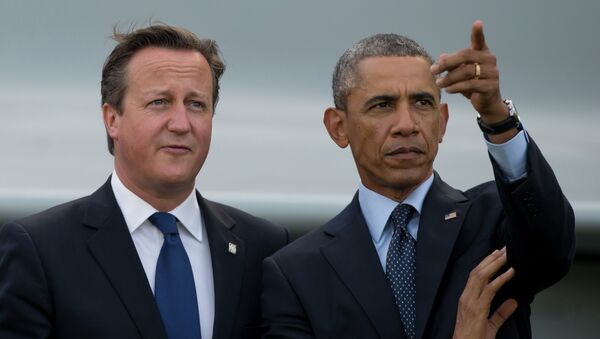And while such support for Britain's old ally in the Gulf isn't surprising, it has once again triggered debate about the direction of UK foreign affairs, and whether they remain closely linked to those of the US.
British-American 'Special Relationship'
The close cultural and historical links between Britain and the US have led to the creation of a so-called 'special relationship' between the two countries, which have seen significant cooperation on many international issues since World War Two.
The two countries have worked together to establish NATO, and continue to build trade, economic and security ties which have led to widespread intelligence sharing operations between British and American security agencies.
Where Is Foreign Policy in #UK Election Debates? @RobinNiblett http://t.co/SktJwsxLoJ via @CarolineHydeTV #GE15 pic.twitter.com/ySs6Fg5cnM
— Forward Guidance (@ecoeurope) April 14, 2015
However, some critics have argued that the UK is becoming increasingly unclear on its foreign policy direction, which has been demonstrated by the lack of debate on foreign affairs issues in the lead up to the May 7 election.
Other critics have gone further to suggest that instead of developing its own independent approach, Westminster merely follows the lead of Washington when addressing global issues.
The Middle East
Many prominent foreign affairs issues in previous decades have revolved around the Middle East, where Britain has joined the US in military and diplomatic interventions in a number of countries such as Afghanistan, Libya and Iraq.
These interventions, notably in 2003, when then UK Prime Minister Tony Blair convinced parliament to go to war in Iraq, have been widely criticized by the British public, and have led to suggestions that Britain was merely following the US' lead when dealing with Middle Eastern affairs.
In a report prepared by the US Congressional Research Service, analyst Derek E Mix noted how the war in Iraq brought forward perceptions that Britain was simply pandering to the interests of the Americans, and increased calls for Britain to follow its own agenda:
"The Blair-Bush years also launched debate in the UK about whether future British prime ministers might think twice about boldly supporting controversial US policies or whether they might make more explicit demands of the United States as the price for support."
"Some British observers became anxious to assert that British national interests come first in deciding British policy, that these interests are not always identical to US national interests, and that the UK should not be overly deferential to the United States in foreign policy issues," said Mix.
Syria: A Fork in the Road?
The widely unpopular nature of Britain's Iraq intervention was seen as a key factor in the British parliament's decision not to join US military action against Bashar al-Assad's regime in Syria in August 2013.
Prime Minister David Cameron suffered a humiliating defeat when many of his own MPs voted against military action, prompting then Defense Secretary Philip Hammond to say:
"I think it tells us that there is a deep sense of unease about British military involvement in the Middle East and that largely stems from what happened in 2003."
However, many others saw this as a key point in Britain taking a more independent approach to its foreign affairs, as it was the first time in decades that the UK had not joined the US in a Middle Eastern conflict.
Beyond 2015: Continuing the 'Special Relationship' or More Independence?
The lack of political talk about foreign policy issues, except for some debate about Britain's place in the EU, has only heightened concerns that the UK isn't overly concerned about global issues.
UK foreign policy and the EU will be among topics discussed at our public #GE2015 debate on 30th April: http://t.co/8NJq6IUw9H #CityExperts
— City Press Office (@NewsfromCity) April 15, 2015
Fraser Cameron, director of the Carnegie EU-Asia Center believes the UK is becoming more inward-looking, and doesn't have a clear-cut foreign policy plan.
"British Prime Minister David Cameron has shown little or no interest in foreign policy, preferring to task UK embassies with flogging British cars. Sadly, the opposition Labour Party, although less infected with the anti-EU virus that runs through the ruling Conservative Party, also shows little vision for what role Britain can and should play in the world."
However others disagree — James Rogers, lecturer in European security at the Baltic Defense College, while taking part in a Carnegie Center debate, argued that the UK does still have significant global interests, given its involvement in a number of international organizations such as the UN Security Council.
Five things you need to know about foreign policy before the UK election. http://t.co/1re0Zypy81
— openDemocracy (@openDemocracy) April 12, 2015
"Since 2012, and uniquely among European powers, the UK has pushed firmly into the Indo-Pacific, having formed new defense partnerships with the Gulf states, Japan, and Australia, among others."
Foreign policy pretty much ignored by both major parties. A real change in UK politics post Iraq/Afghanistan @b_judah
— Peter Jukes (@peterjukes) April 13, 2015
Although there has been speculation that Westminster's special relationship with Washington could be loosening as the modern interests of the countries diverge, analyst Derek E Mix from the Congressional Research Service believes these calls are premature.
"Most analysts agree that the US-UK political relationship is likely to remain close; that the 'special relationship' will remain strong on many vital issues in which the UK is a crucial US ally… Analysts observe that many concerns and assertions about an impending break-up of the 'special relationship' tend to be exaggerations."





